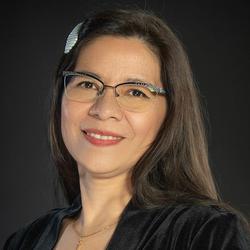ENE Research Seminars
During the fall and spring semesters, the Purdue School of Engineering Education (ENE) hosts a weekly research seminar from 3:30-4:20 p.m. most Thursdays. These seminars provide the engineering education community a chance to get together to talk about new ideas, share successes and new research, and support developing research. Please join us! We welcome graduate and undergraduate students, staff, and faculty from across the university with an interest in educating engineers.
Please contact Şenay Purzer, Associate Head of ENE Graduate Programs and Professor of Engineering Education, with any questions or to recommend future speakers.
Upcoming Events
February 26, 2026
This interactive seminar explores how early diagnostics and flexible instructional tools can be used to assess and develop students' computational thinking skills across engineering curricula. Noemi Mendoza Diaz from Texas A&M presents scalable, language-agnostic teaching strategies that support learning in classrooms of any size while grounding essential AI and machine learning competencies. The talk also addresses the educational and psychological implications of the growing reliance on chatGPT.
March 12, 2026
Join us for a seminar with Sharon Miller, Associate Professor of Engineering Practice in the Weldon School of Biomedical Engineering and Assistant Vice Provost for Purdue University in Indianapolis, as she explores how embedding team-based biomedical design projects across three consecutive years of an undergraduate curriculum impacts student self-efficacy. Dr. Miller will share insights into how continuous exposure to real-world design—and experiences beyond the classroom like clinical immersion—can strengthen students’ belief in their ability to succeed.
Past Events
February 19, 2026
This research seminar challenges us to rethink intelligence, ability, and progress in the age of artificial intelligence (AI). Rua Williams, an assistant professor in Purdue's School of Applied and Creative Computing and a former Just Tech Fellow with the Social Science Research Council, will discuss how cultural assumptions about disability and eugenics are embedded in AI systems, shaping new forms of inequality and harm. Attendees will leave with tools to critically evaluate AI’s promises and imagine more just technological futures.
February 12, 2026
As artificial intelligence (AI) takes on cognitive and creative tasks once considered uniquely human, Clinical Assistant Professor for Purdue's Gifted, Creative, and Talented Studies Benna Haas invites educators and scholars to reconsider what intelligence means today. Grounded in gifted, creative, and talented studies and drawing from research in human–AI interaction, her talk explores how human and AI intelligences intersect, diverge, and co-evolve.
February 5, 2026
Drawing on experience as an industry instructor and time spent shadowing a First-Year Engineering course, PhD Candidate Sage Maul's ENE 590 Presentation will explore key contrasts, challenges, and strategies for tailoring instruction to diverse learning contexts. Then first-year PhD student Aadithan Anbuvanan will discuss a collaborative learning framework that integrates reverse engineering with generative AI and a large-language model.
January 29, 2026
In this ENE-hosted, student-exchange research seminar, UGA PhD Candidate Deborah Moyaki discusses emerging technologies in engineering education, arguing that the associated research focuses too much on adoption metrics and not enough on how the metrics support learning and career development. She presents a new, human-centered framework that looks at how faculty meaningfully use technology in real educational contexts.
January 22, 2026
UMich Assistant Professor and Engineering Education Research Chair Karin Jensen, PhD, examines how the culture of normalized stress in engineering undermines student well-being and thriving, and how these norms shape help-seeking and peer interactions. She presents new tools and interventions that use longitudinal data and integrated curricula to promote a culture of wellness alongside technical learning.
December 11, 2025
Purdue PhD candidates Jorge Cristancho Rodriguez and Kevin Jay Kaufman-Ortiz will present on their ENE 590 research.
December 4, 2025
Join Purdue ENE PhD Alum Catherine Berdanier as she uncovers key insights into the experiences of engineering graduate students, exploring what drives success, resilience, and the challenges that lead some to step away from the field. Her research bridges disciplines to reveal actionable strategies for supporting the next generation of engineers.
November 20, 2025
Curious about what's next in your journey as an engineering educator? Join Dr. Audeen Fentiman for this interactive seminar that looks at the past, present, and possibilities ahead in engineering education, and invites you to imagine your own path forward.
November 13, 2025
Associate Professor in the Purdue University Libraries & School of Information Studies David Zwicky will share his expertise on Artificial Intelligence and Machine Learning (AI/ML) in Engineering Education with particular emphasis on the Scite research tool.
November 6, 2025
Virginia Tech Associate Professor Andrew Katz will present a comprehensive overview of methodological innovations developed in the IDEEAS Lab to leverage the power of generative AI, large language models, and NLP techniques for advancing engineering education.

